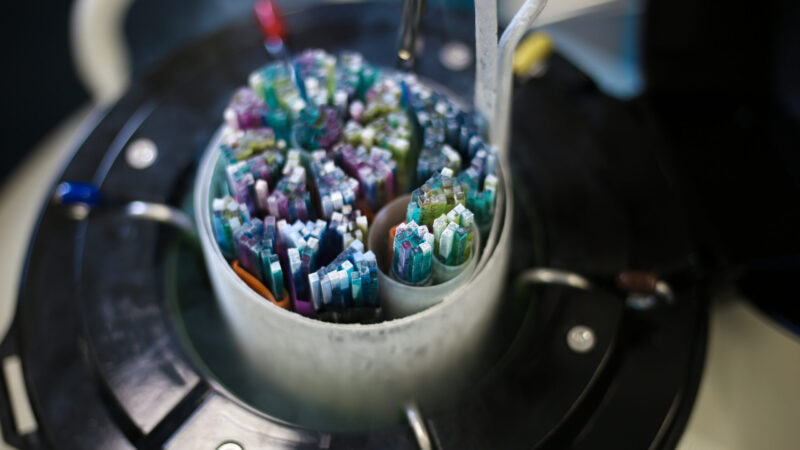A mother asks what’s next after Alabama Supreme Court ruling that frozen embryos are children
Following an Alabama Supreme Court ruling that found frozen embryos are children under state law, the University of Alabama at Birmingham Health System said it will pause in vitro fertilization treatments. At least two other facilities have done the same. The decision leaves many patients unable to access their embryos and wondering if they will be able to continue their IVF treatment.
WBHM’s Richard Banks spoke with one of those patients, Dr. Aubrey Coleman, who’s also a pediatrician and a mom. Coleman began by explaining how she began her treatments at UAB.
This interview was edited for time and clarity.
I started the IVF process in the summer of 2021 and was able to transfer my first embryo in December of 2021, and then I had my daughter in the summer of 2022. We still have six embryos frozen at UAB, and we were kind of gearing up to do another transfer, or start the process of going to do another transfer, when all this happened.
Do you feel like your embryos are being held hostage?
I know that this probably sounds hyperbolic, but I was like, “Okay, well, if they don’t let me transfer them and if they are my children … could people get in trouble for keeping my embryos from me?” And then on the flip side, I was like, “Okay, well, if they’re technically children, then I moved out of state … then somebody could come at me with child abandonment or some crazy thing like that.” And so I just kind of spiraled. But I would hope it’s not going to come to that. But who knows, now.
As a mother or in technical terms, an owner of frozen embryos. How do you feel? How do you feel as a doctor?
For me, this is a huge violation. And it’s kind of insulting to say that hundreds of cells that are sitting in the lab … that have have no chance of surviving outside of a uterus … It’s really a slap in the face to me, medically, and as a mom, to say that those embryos are the same as my child.
Do you feel like this is potentially the start of something that could go national, that could affect other states, like it did Alabama?
I and other people in the medical community, we all said when Roe versus Wade was overturned, “Okay, well, next they’re going to come for this.” And the people who had such black and white views about Roe versus Wade in abortion were, like, that’s insane. No, that will never happen. And now, less than two years later, here we are. And so I think it’s not going to be surprising at all, when the states that have full abortion bans adopt restrictions like this. And I think the confusion is, and where all these clinics, understandably, are being extra cautious, is there is no legislation saying that fertility treatments are protected.
As a doctor, someone who works in health care. How do you feel that this move by the Alabama Supreme Court will affect the state?
This is just going to continue to drive more OB-GYNs out of the state, and it’s already a huge crisis. I used to be a pediatrician in Eufaula, Alabama, and my patients there — the moms — they would have to travel 60 miles to the nearest hospital to deliver. And laws like this — or not that it’s a law — but restrictions like this, are just going to continue to keep the good talent and medicine out of states like Alabama.
Bill making the Public Service Commission an appointed board is dead for the session
Usually when discussing legislative action, the focus is on what's moving forward. But plenty of bills in a legislature stall or even die. Leaders in the Alabama legislature say a bill involving the Public Service Commission is dead for the session. We get details on that from Todd Stacy, host of Capitol Journal on Alabama Public Television.
My doctor keeps focusing on my weight. What other health metrics matter more?
Our Real Talk with a Doc columnist explains how to push back if your doctor's obsessed with weight loss. And what other health metrics matter more instead.
Baz Luhrmann will make you fall in love with Elvis Presley
The new movie is made up of footage originally shot in the early 1970s, which Luhrmann found in storage in a Kansas salt mine.
Forget the State of the Union. What’s the state of your quiz score?
What's the state of your union, quiz-wise? Find out!
A team of midlife cheerleaders in Ukraine refuses to let war defeat them
Ukrainian women in their 50s and 60s say they've embraced cheerleading as a way to cope with the extreme stress and anxiety of four years of Russia's full-scale invasion.
As the U.S. celebrates its 250th birthday, many Latinos question whether they belong
Many U.S.-born Latinos feel afraid and anxious amid the political rhetoric. Still, others wouldn't miss celebrating their country








